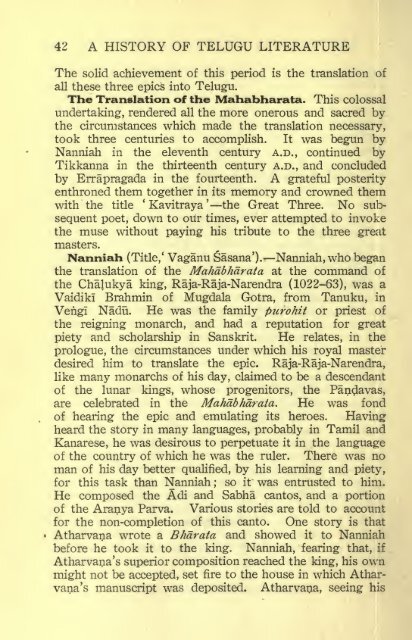A history of Telugu literature; - Cristo Raul
A history of Telugu literature; - Cristo Raul
A history of Telugu literature; - Cristo Raul
You also want an ePaper? Increase the reach of your titles
YUMPU automatically turns print PDFs into web optimized ePapers that Google loves.
42 A HISTORY OF TELUGU LITERATURE<br />
The solid achievement <strong>of</strong> this period is the translation <strong>of</strong><br />
all these three epics into <strong>Telugu</strong>.<br />
The Translation <strong>of</strong> the Mahabharata. This colossal<br />
undertaking, rendered all the more onerous and sacred by<br />
the circumstances which made the translation necessary,<br />
took three centuries to accomplish. It was begun by<br />
Nanniah in the eleventh century A.D., continued by<br />
Tikkanna in the thirteenth century A.D., and concluded<br />
by Errapragada in the fourteenth. A grateful posterity<br />
enthroned them together in its memory and crowned them<br />
'<br />
with the title Kavitraya '<br />
the Great Three. No subsequent<br />
poet, down to our times, ever attempted to invoke<br />
the muse without paying his tribute to the three great<br />
masters.<br />
Nanniah (Title/ Vaganu Sasana'). Nanniah, who began<br />
the translation <strong>of</strong> the Mahabharata at the command <strong>of</strong><br />
the Chalukya king, Raja-Raja-Narendra (1022-63), was a<br />
Vaidiki Brahmin <strong>of</strong> Mugdala Gotra, from Tanuku, in<br />
Vengi Nadu. He was the family purohit or priest <strong>of</strong><br />
the reigning monarch, and had a reputation for great<br />
piety and scholarship in Sanskrit. He relates, in the<br />
prologue, the circumstances under which his royal master<br />
desired him to translate the epic. Raja-Raja-Narendra,<br />
like many monarchs <strong>of</strong> his day, claimed to be a descendant<br />
<strong>of</strong> the lunar kings, whose progenitors, the Pandavas,<br />
are celebrated in the Mahabharata. He was fond<br />
<strong>of</strong> hearing the epic and emulating its heroes. Having<br />
heard the story in many languages, probably in Tamil and<br />
Kanarese, he was desirous to perpetuate it in the language<br />
<strong>of</strong> the country <strong>of</strong> which he was the ruler. There was no<br />
man <strong>of</strong> his day better qualified, by his learning and piety,<br />
for this task than Nanniah ; so it was entrusted to him.<br />
He composed the Adi and Sabha cantos, and a portion<br />
<strong>of</strong> the Aranya Parva. Various stories are told to account<br />
for the non-completion <strong>of</strong> this canto. One story is that<br />
Atharvana wrote a Bhdrata and showed it to Nanniah<br />
before he took it to the king. Nanniah, fearing that, if<br />
Atharvana 's superior composition reached the king, his own<br />
might not be accepted, set fire to the house in which Atharvana's<br />
manuscript was deposited. Atharvana, seeing his

















